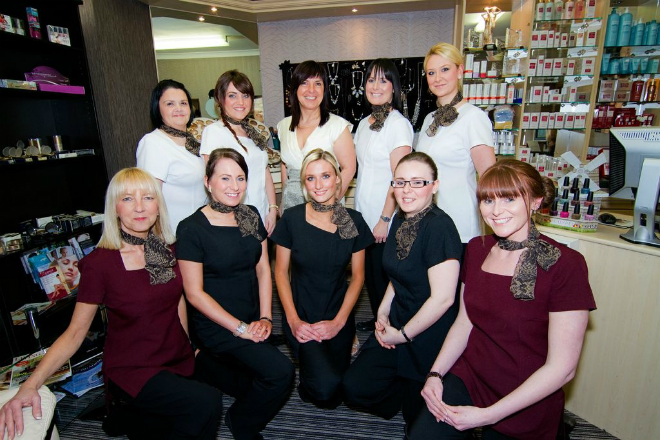Salon focus: Susan Routledge on apprentices
To mark the recent National Apprentice Week, Professional Beauty is taking a look at how business owners in our industry implement apprentices in their organisations. To kick things off we spoke to Professional Beauty Award winning employer Susan Routledge at Finishing Touch Clinic in County Durham about her experiences and what advice she has for business owners looking to take on an apprentice.
Professional Beauty: How regularly do you take on apprentices?
Susan Routeledge: We take an apprentice every two years and put them on a two year programme so as one therapist qualifies we have another one coming up the ranks.
PB: Do you take on intermediate level apprentices as well as advanced?
SR: At Finishing Touch we only take apprentices who have qualified already to intermediate (NVQ level 2) as we know they have the basic skills and knowledge ready for us to enhance with our procedures. The apprentice can therefore integrate as part of our team and start generating a clientele and contribute to salon income as soon as we feel they are competent to our standards.
Apprenticeships are available at level 2 (intermediate level) but personally I feel that the apprentice would have limited employable skills in a salon or spa. An intermediate trainee could be utilised to set up rooms and assist other therapists on reception, which may benefit some businesses. They could only be introduced to clients one skill at a time, as their training units were passed, but clients would be very aware that the therapist was learning. With a NVQ level 3 apprentice clients don’t need to be aware, as they are already trained in all of their basic skills and they are enhancing their skills with the programme to include more advanced skills, such as electrical treatments.

PB: What do your apprenticeships involve?
SR: I think there are a lot of misconceptions surrounding apprenticeships. The process is the same as employing anyone new. You interview candidates and make your selection and they become a member of your team. They also have a learning agreement with the college or training provider too.
If your apprentice proves to be unsuitable then you do not have to keep them. It is the responsibility of the training provider to find a new placement for the person and in turn you can interview again. Your commitment is to helping the apprentice to gain the skills to complete the training programme, alongside the apprentice’s formal training with the training provider, which is usually around one day a week. This is not a huge commitment of time as it is a gradual learning process and it also ensures that the apprentice is constantly learning how to adapt a treatment to your standards to be performed for a client when the time comes.
PB: What challenges you have experienced taking on apprentices?
SR: I have found it no different to settling in any new member of the team. It needs to be handled correctly though. We make sure that clients are unaware of the apprenticeship programme – we feel it is unnecessary as we can guarantee that all of our team are fully qualified and insured to be working to their qualified level. This also keeps the therapists' confidence high when dealing with clients.
Our apprentice is treated no different at all and has all of the staff benefits including the same holidays and a commission structure. The commission structure is our policy and not part of the apprenticeship requirements. Due to the lower salary outlay, it means that commission based on sales allows our apprentice to easily make money in relation to her growing clientele and makes her feel part of the team. It also is a great incentive to progress and build a clientele.
PB: What benefits have you felt?
SR: We always retrain a new member of staff, experienced or not, to our standards anyway before allowing them to work on clients, so being able to gradually train someone into new treatments is ideal with less pressure on us and the therapist.
It has allowed us to promote our existing therapists into more advanced treatments and pass over all of our new nail and waxing clients to our apprentice giving a clear career progression path to our team.
It always takes a while to introduce any new therapist to existing clients, so due to the lower financial outlay employing an apprentice makes it far less stressful not to have a full column from day one.
Another huge benefit is that training providers follow college holiday programmes. Your apprentice would be working for you whilst not training therefore you have an extra cover one day day per week during busy times like Christmas, Easter and summer holiday time.

PB: Do you think the beauty industry does enough with apprentices?
SR: I don't think the beauty industry does enough but I think that is due to misconceptions. There are so many benefits, but like employing anyone it is all down to finding the right candidate. Due to the upcoming changes to funding surrounding full-time NVQ level 3 training, I think that an employer will have a larger selection of therapists wanting to take an apprentice route.
Our current apprentice is 27 years old and it has been a great way for her to find full-time employment after bringing up her family. Apprenticeships are not restricted to the very young – anyone can apply but the low initial salary is a barrier to many.
There are lots of incentives to taking an apprentice under 24 years old. Currently there are grants of £1500 to help employers introduce an apprentice, and other incentives available in different parts of the UK, so you can actually get paid to take on an apprentice. The current salary is £2.65 an hour and if the apprentice is over 18 then the training day each week is paid by the employer but that is only a maximum of 8 hours.
PB: Do you think there is a difference in the standard of therapist that is trained as an apprentice and those that are trained in college?
SR: The advantage of having an apprentice is that you have far more input into how the training is structured and can mould the therapist to how you want to be performed. It's a two-way thing so your apprentice is not just learning one methodology and technique, and will therefore be far more adaptable. You also have the backup and contact from the training provider for help and advice.

PB: Are there any differences between your employees that started with you as an apprentice and those that come from outside?
SR: As an employer, I find it hugely satisfying seeing someone grow and evolve and I think it is a far more relaxed way to introduce someone at a slow steady pace rather than bringing someone in and knowing we need them to be generating an income immediately. We only take on an apprentice with a long-term view of them staying with us long beyond the apprenticeship. Our first apprentice won Apprentice of the Year for her college whilst training and is still with us after five years. Our team love to help with training so it is also a great constant team building exercise too.
We have never lost anyone to another salon in 25 years but that is down to the commitment we give to our team at all levels of employment. I think the only way an employer wouldn't see the benefit is, if they employed an apprentice as cheap labour and classed them as an apprentice. It has to be commitment from both sides.

